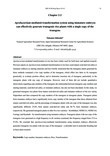Agrobacterium-mediated transformation system using immature embryos can effectively generate transgenic rice plants with a single copy of the transgene
JIRCAS Working Report
| ISSN | 1341710X |
|---|---|
| NII recode ID (NCID) | AA11159468 |

Full text
jircas_working_report91-_25-34.pdf668.18 KB
Agrobacterium-mediated transformation in rice has been widely used for both basic and applied research. Previous reports on Agrobacterium-mediated transformation in rice have used mature seed-derived callus or immature embryos as starting materials and have briefly mentioned that the transgenic plants generated by these methods contained a low copy number of the transgene, which offers less labor to fix transgene genetically, to evaluate position effects, and to determine insertion site of transgene, particularly in thetransgenic plants with one copy of transgene. However, most of them did not include quantitative observations regarding copy numbers of the transgene; the relationship between transgene copy numbers and starting materials, seed-derived callus, or immature embryos, has also not been elucidated. In this study, we generated transgenic rice plants from mature seed-derived callus and immature embryos of the rice variety Nipponbare and then compared the copy numbers of the transgene in transgenic plants. Transgenic plants from immature embryos had a significantly lower copy number of the transgene than those obtained from mature seed-derived callus, and the percentage of transgenic plants with one copy of the transgene was also significantly different: 25.0% from mature seed-derived callus and 46.7% from immature embryos, respectively. We generated transgenic plants in other five rice varieties—Koshihikari, NERICA1, NERICA4, Curinga, and Kasalath—by transformation using immature embryos. Transgenic plants with one copy of the transgene were generated at a high frequency in all varieties examined; this frequency ranged from 37.6 to 87.0%. We conclude that Agrobacterium-mediated transformation using immature embryos effectively generates transgenic rice plants with one copy of the transgene—a desirable trait in molecular breeding and in basic plant research.
| Date of issued | |
|---|---|
| Creator | Takuma Ishizaki |
| Subject | Copy number Immature embryos Rice Transformation |
| Publisher | Japan International Research Center for Agricultural Sciences |
| Type | Technical Report |
| NII resource type vocabulary | Technical Report |
| Volume | 91 |
| spage | 25 |
| epage | 34 |
| Language | eng |
